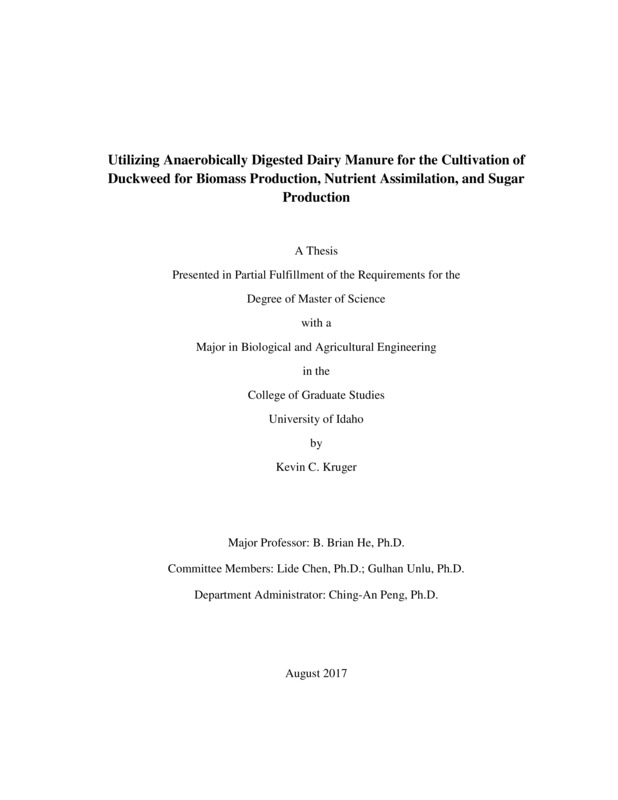Utilizing Anaerobically Digested Dairy Manure for the Cultivation of Duckweed for Biomass Production, Nutrient Assimilation, and Sugar Production
Kruger, Kevin Conrad. (2017-08). Utilizing Anaerobically Digested Dairy Manure for the Cultivation of Duckweed for Biomass Production, Nutrient Assimilation, and Sugar Production. Theses and Dissertations Collection, University of Idaho Library Digital Collections. https://www.lib.uidaho.edu/digital/etd/items/kruger_idaho_0089n_11218.html
- Title:
- Utilizing Anaerobically Digested Dairy Manure for the Cultivation of Duckweed for Biomass Production, Nutrient Assimilation, and Sugar Production
- Author:
- Kruger, Kevin Conrad
- Date:
- 2017-08
- Keywords:
- Bioethanol Production Bioresource Technology Nutrient Cycling
- Program:
- Biological & Agricultural Engineering
- Subject Category:
- Energy; Engineering; Water resources management
- Abstract:
-
Nutrient management methods are needed to provide sustainable operation to livestock production that balance the costs of operation and maintenance. Cultivating duckweed on dairy wastes is considered an effective way of nutrient uptake and cycling. Duckweed cultivation has been implemented on nutrient management systems, such as constructed wetlands and waste stabilization ponds that use both domestic and swine wastewater. The objectives of this study were to (1) identify a nutrient concentration and duckweed strain that rapidly produces biomass, (2) removes nutrient content from anaerobically digested dairy manure, and (3) produces starch from nutrient starvation.
To complete these objectives, this study targeted estimating growth and nutrient rate constants as well as starch yield of duckweed under different cultivation conditions. The strains of duckweed, Landoltia punctata 0128, Lemna gibba 7589, and Lemna minuta 9517 were identified as the promising candidates for their high levels of nutrient uptake, starch accumulation, and biomass production. The growth rate of the duckweed strain was assessed based on the effects of temperature, pH, dissolved oxygen, light intensity, nutrient concentration, and biomass accumulation. The nutrient uptake through duckweed cultivation on the anaerobically digested (AD) dairy manure, characterized by the changes of total nitrogen (TN), total Kjeldahl nitrogen (TKN), total phosphorus (TP), and ortho-phosphate-phosphorus (o-PO4-P), was assessed in four nutrient dilution ratios 1:5, 1:13, 1:18, and 1:27 v/v at two light intensities of 10,000 and 3,000 lux to model seasonal variation.
The duckweed strain that exhibited the best biomass production, nutrient removal and starch accumulation was Landoltia punctata 0128 at a dilution ratio of 1:27 at a light intensity of 10,000 lux. The growth rate constant established from zero order kinetics for Landoltia punctata 0128 was 13.3 gm-2d-1. The rate constants for nutrient recovery were 0.122 d-1of TN, 0.136 d-1 of TKN, 0.145 d-1 of TP, and 0.173d-1 of o-PO4-P. The batch efficiency of cultivation for Landoltia punctata 0128 on dilution ratio 1:27, in terms of nutrient uptake was 38% m/m in relation to the total nitrogen removed. The starch yield was measured at 30% w/w for Landoltia punctata 0128 after the nutrient starvation process. Due to its ability to reduce nutrients from AD dairy manure, accumulate biomass at a rapid growth rate, and accumulate a high yield of starch, Landoltia punctata 0128 has great potential to become a preferred choice for nutrient recovery and biomass and bioethanol production.
- Description:
- masters, M.Engr., Biological & Agricultural Engineering -- University of Idaho - College of Graduate Studies, 2017-08
- Major Professor:
- He, Brian; Chen, Lide
- Committee:
- Unlu, Gulhan
- Defense Date:
- 2017-08
- Identifier:
- Kruger_idaho_0089N_11218
- Type:
- Text
- Format Original:
- Format:
- application/pdf
- Rights:
- In Copyright - Educational Use Permitted. For more information, please contact University of Idaho Library Special Collections and Archives Department at libspec@uidaho.edu.
- Standardized Rights:
- http://rightsstatements.org/vocab/InC-EDU/1.0/

